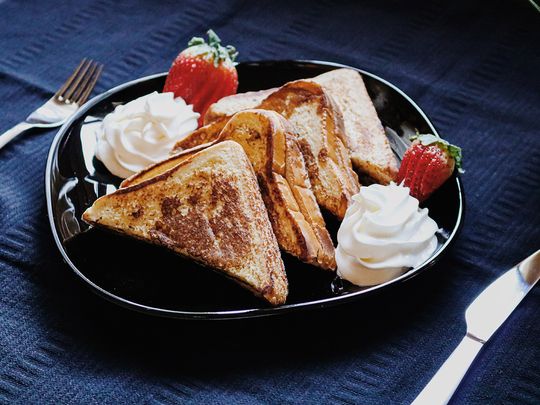
Peking duck. French toast. Korean barbecue.
Some of the most beloved meals around the world are attributed to certain places. But just how accurate are those monikers?
Click start to play today’s Word Search and spot ‘Korean barbecue’ among other phrases. Don’t forget to visit Gulf News’ Food section for recipes, guides and everything to do with food.
Here, we take a deep-dive into the origins of popular phrases and learn more about them:
1. French toast
The French toast, believe it or not, has nothing to do with France. Legend has it that it was invented by a man named Joseph French, in 1724. Another story goes that it was the Americans who named this dish French toast, because French immigrants in the US popularised the dish. In fact, the existence of French toast far predates that of France. Its first known recorded recipe comes from 300AD, Rome, where the author Apicius mentioned it in his cookbook, Cooking and Dining in Imperial Rome. Ironically, the French themselves used to call this dish Roman bread, for the longest time.
2. Korean barbecue
Although Korean barbecue, also known as gogi-gui, is all the rage right now, all around the world, it traces its origins to a group of nomadic people called the Maek, in central Asia. This tribe would bring pre-seasoned meats with them, whenever they travelled. At the time, it was a novel method of seasoning meat before cooking, and something that wasn’t normally done in northeast Asia. The technique was used to save time in food preparation, since the tribe was always on the move. Today, grilled meats are usually eaten with banchan, which translates to ‘side dish’ and includes popular vegetarian dishes like kimchi and bibimbap. Together, they form mouth-watering Korean barbecue that has become beloved globally.
3. Turkish delight
Many people recognise this sweet treat from the book and film adaptation, The Chronicles of Narnia by C. S. Lewis. But Turkish delights have a rich history. According to one legend, an Ottoman sultan ordered his confectionary chef to create a dessert that was light on the throat and the teeth. Turkish delight was born. The sultan found that it had a surprisingly effective way of stopping arguments, so he used it often, to restore peace in the palace.
What is your favourite among these treats? Play today’s Word Search and tell us at games@gulfnews.com.







